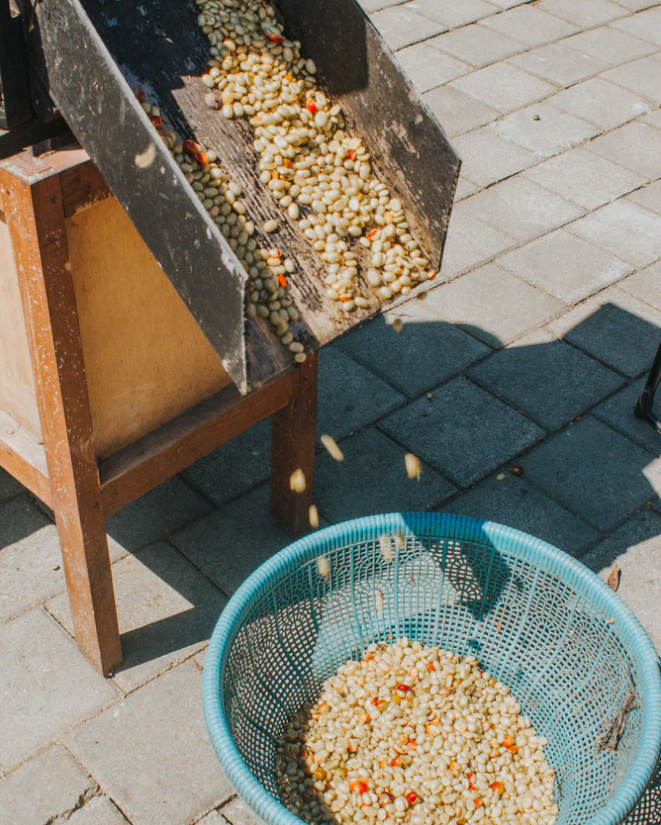It was a big pleasure to meet everyone in our Monday meeting and discuss “Sustainability in Coffee Farming” with Ms. Thủy (Moon’s Coffee Farm) Mr. Dũng and Mr. Đừc (Vườn Nhà Dũng) and our guest, a teacher from an international school Ms. Zhenying Liang! It was a great opportunity to learn a lot about their work and a chance to look closer at the processes at the farms.
How many years have you been processing coffee?
Ms. Thuy: I have taken the farm after my family who ran it for decades before and we still work at the farm together.
Mr. Dung: My family has a tradition of growing coffee for more than 20 years. The family has been working in a traditional way for many years. I’ve started inheriting and processing specialty coffee since 2019. From 2016 up until now, the coffee has been organically cultivated at our farm.
What is the impact of coffee farming on the environment around us?
Ms. Thuy: Depending on the way you grow your coffee it can affect the environment in different ways.
Mr. Dung: The impact of current coffee farming is the excessive use of chemical fertilizers and the depletion of groundwater. It leads to degraded land.
What does “sustainability” mean in coffee farming?
Mr. Dung: Environmental sustainability, land, water, soil, climate, sustainable livelihoods of coffee farmers.
What processes do you implement at your farms that lead to sustainability?
Ms. Thuy: Since I’ve taken the farm over from my parents, we have implemented the following practices:
1. Decrease of chemical fertilizer. Having a partner who provides the organic fertilizer significantly helps us to run this process. They provide chicken poops, organic compost, and support testing the coffee after implementing the practice. Also, we use compost that is made at the farm. It includes soybeans with eggs, bananas, sugarcane, and organic compost for making the fertilizer.
2. Planting intercrop (growing different plants and roots in the same land gives the soil more nutrition).
The big trees (like durians) support smaller plants and help to attract the necessary insects and avoid unwanted ones.
3. It is not necessary to use pesticides. When the plant is strong, it can protect itself! At first, it may look bad and produce fewer cherries, but eventually, you will see that the trees at your farm get stronger.
Mr. Dung: The coffee tree was found under the shade of other trees in the forest. When other trees grow around the coffee plants it creates a natural moisture level. In monocultures, the plants get just a certain level of wind and moisture. But in polycultures- coffee gets enough moisture wind and nutrition as the other plants need it as well.
Growing other plants like pepper, banana, and avocado. It helps the coffee to get more flavors. No NBK chemical fertilizers and pesticides are used to protect the good insects at the farm as well. And the natural environment as well.
What I do is: arrange shade for coffee trees, and diversify crops in the garden, I do not use chemical fertilizers and pesticides. I use local compost, reduce watering, and maintain mulch. All this helps to stabilize the farm.
What difficulties do you have in maintaining these processes?
Ms. Thuy: People don’t want to change the process. And it’s extremely hard to convince them to take a risk, as the coffee yield will get lower and they won’t be able to sell enough.
Mr. Dung: Initially there were difficulties with the family, they did not accept the change, but I overcame it.
What are your intentions and goals for having a sustainable coffee farming model in the next few years?
Ms. Thuy: We are going to take a step-by-step change to turn our processes towards having a better-quality coffee every year rather than a bigger quantity, as it used to be for years before.
Example (real numbers may be different): We have 1 hector and previously we could get 3 tons per year and sell it with 40.000 and per 1kg. The new way would be different: from 1 hector we are getting 2 tons, but the coffee can be sold at 60.000 vnd per year. And in 2 years we are planning to increase our harvest to 2,5 tons.
What is the future of sustainable coffee farming in the next few years? What is needed to improve farming nationally and maintain it?
Dr. Dung: Climate change is having a great impact on the coffee industry, fertilizer prices are increasing, and to adapt to that, sustainable coffee farming is a good direction for coffee growers.
Thank you, Ms. Thuy, Mr. Dung, Mr. Duc, and Ms. Zhenying for the time to participate and answer our questions. We can’t wait to try your coffees this year and introduce them to our friends and customers in Vietnam and other countries in the nearest future!
Contacts:
MOON’S COFFEE FARM:
+84 372290548
1418 Truong Chinh Street, Chi Lang Ward, Pleiku City, Gia Lai, Viet Nam
Vườn Nhà Dũng:
+ 84 822915573
[email protected]


